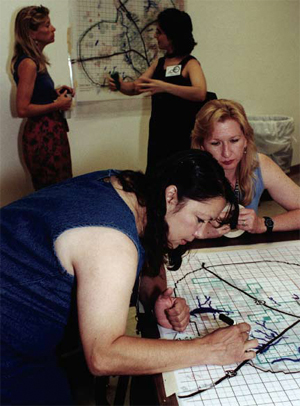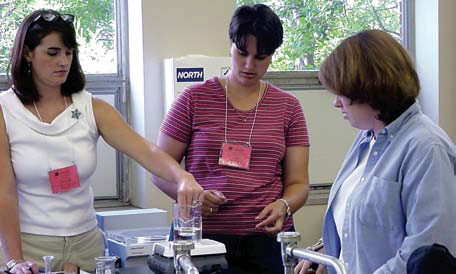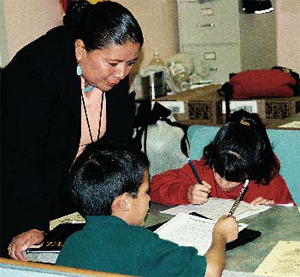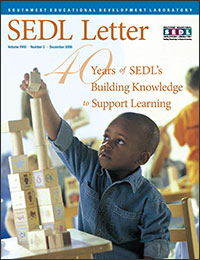The 2000s: Rigor, Research, and Resilience
"Meeting the needs of all children requires a strong research base that is tightly connected to practice."
— Dr. Wesley A. Hoover, 1999
With the new millennium came the presidency of George W. Bush and a strengthened emphasis on accountability and research. The 2001 reauthorization of the ESEA, or the No Child Left Behind Act (NCLB), sets a high bar for achievement in core content areas, outlines requirements for highly qualified teachers, and mandates professional development and educational services that are firmly grounded in rigorous scientific research. Though its funding and mechanisms have been debated, its goals of eliminating achievement gaps and ensuring that all students achieve at high levels have been broadly supported. From 2000  through 2005, SEDL focused intensively on helping states understand and begin to address the new NCLB requirements and to access research-based resources that meet the law’s strict standards.
through 2005, SEDL focused intensively on helping states understand and begin to address the new NCLB requirements and to access research-based resources that meet the law’s strict standards.
In recent years, the Bush administration has made major changes in a number of federal programs, including several that had been linchpins for SEDL’s regional service work. The administration eliminated the regional math and science consortia and the regional technology in education consortia, both programs for which SEDL had long been a contractor. For the 2006 regional laboratory recompetition, the Department of Education once again shifted the labs’ mandate, this time requiring the bulk of resources to be devoted to randomized controlled trials of educational interventions. Though SEDL offered a competitive proposal, for the first time in the institution’s history, it failed to obtain the regional laboratory contract, losing its bid on the basis of its small business subcontracting arrangements rather than on the merits of the proposed work.

SEDL once again demonstrated both its resilience and its relevance to the educational reform landscape at state, regional, and national levels, however. In 2003, SEDL became the lead organization for the National Partnership for Quality Afterschool Learning, which is assessing the effectiveness of afterschool programs in strengthening student engagement and achievement. In 2005 SEDL was awarded contracts for two regional comprehensive centers, one serving Texas and the other serving five southeastern states. The comprehensive center program, a restructuring of the former regional consortia and regional technical assistance centers, is designed to help build state and local capacity to address the goals and requirements of NCLB.
 SEDL also has been named as the national coordinator to provide technical assistance to the nationwide network of Parental Information and Resource Centers, an initiative that will be part of SEDL’s National Center for Family and Community Connections with Schools, which is also conducting an exploration of models of community engagement through a partnership with the Kettering Foundation. SEDL has continued to grow its research and evaluation capacity through a number of projects, including evaluations of programs addressing English language learners, high school completion and success, core content instruction, and professional development strategies.
SEDL also has been named as the national coordinator to provide technical assistance to the nationwide network of Parental Information and Resource Centers, an initiative that will be part of SEDL’s National Center for Family and Community Connections with Schools, which is also conducting an exploration of models of community engagement through a partnership with the Kettering Foundation. SEDL has continued to grow its research and evaluation capacity through a number of projects, including evaluations of programs addressing English language learners, high school completion and success, core content instruction, and professional development strategies.
At SEDL we are proud as our work continues into our fifth decade—as we change to meet the nation’s educational challenges, strive to make a difference through quality research and development, and work with partners and clients to solve problems in classrooms and communities throughout the country. Today, more than ever, we affirm our enduring commitment to “understanding and confronting the hard problems facing children, families, and educators” throughout this great nation.
Next Article: SEDL Timeline

